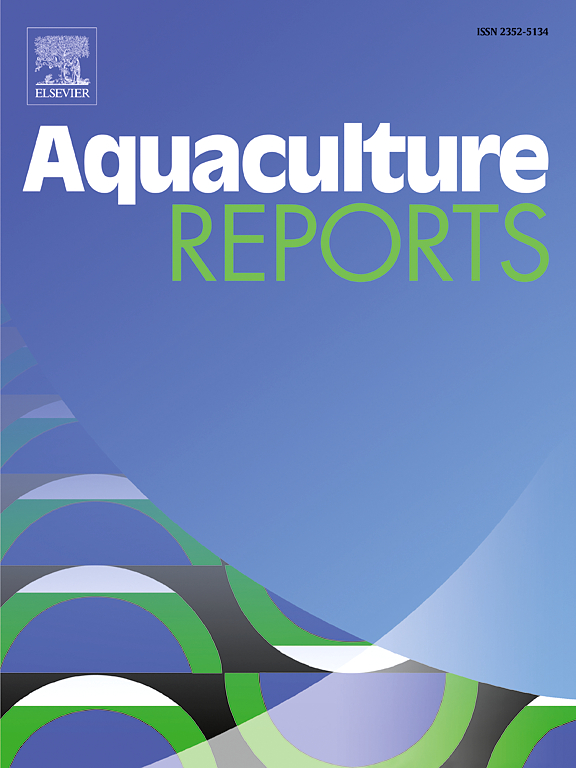通过膳食补充牛油果(Persea americana)种子粉提高尼罗罗非鱼(Oreochromis niloticus)的生长、免疫力和基因表达能力
IF 3.2
2区 农林科学
Q1 FISHERIES
引用次数: 0
摘要
本研究评估了在生物絮团系统中饲养尼罗罗非鱼(Oreochromis niloticus)8 周期间,饵料中添加不同剂量(0、10、20、40 和 80 g kg-1)的鳄梨籽粉(AS)对其生长性能、免疫反应和基因表达的影响。总共 300 尾尼罗罗非鱼幼苗(平均体重 14.67 ± 0.07 克)被随机分配到五个处理组,每个处理组有三个重复,每个鱼缸 20 尾鱼。结果表明,添加 AS 的鱼类在生长和免疫反应方面有明显改善(p < 0.05),尤其是喂食 10 g kg-1 AS 饲料(AS10)的鱼类,其生长和免疫反应的改善最为明显。相比之下,饲喂更高剂量 AS(AS20、AS40 和 AS80)的鱼类与对照组相比没有明显的统计学差异(p > 0.05)。此外,AS10 组在肝脏和肠道组织中的关键免疫相关基因(IL-1、IL-8 和 LBP)和抗氧化相关基因(GST-α、GPX 和 GSR)的 mRNA 表达均有显著上调(p < 0.05),表明免疫和抗氧化反应增强。AS10 组的表达水平最高。这些研究结果表明,在日粮中添加 10 g kg-1 牛油果籽粉末可显著提高在生物絮凝物系统中饲养的尼罗罗非鱼的生长、免疫功能和基因表达。这些结果突出表明,鳄梨籽是一种很有前景的饲料添加剂,可改善尼罗罗非鱼水产养殖的可持续性。本文章由计算机程序翻译,如有差异,请以英文原文为准。
Enhancing growth, immunity, and gene expression in Nile Tilapia (Oreochromis niloticus) through dietary supplementation with avocado (Persea americana) seed powder
This study evaluated the effects of dietary supplementation with different doses (0, 10, 20, 40, and 80 g kg−1) of powdered avocado seed (AS) on the growth performance, immunological response, and gene expression of Nile tilapia (Oreochromis niloticus) reared in a biofloc system over 8 weeks. A total of 300 Nile tilapia fingerlings (average weight 14.67 ± 0.07 g) were randomly assigned to five treatment groups, each with three replicates, and 20 fish per tank. The results demonstrated significant improvements (p < 0.05) in growth and immune response in AS-supplemented fish, particularly in those fed the 10 g kg−1 AS diet (AS10), which showed the most notable increases. In contrast, fish fed higher AS doses (AS20, AS40, and AS80) exhibited no statistically significant differences compared to the control group (p > 0.05). Additionally, the AS10 group exhibited a significant upregulation (p < 0.05) in the mRNA expression of key immune-related genes (IL-1, IL-8, and LBP) and antioxidant-related genes (GST-α, GPX, and GSR) in both liver and intestinal tissues, indicating enhanced immune and antioxidant responses. The highest expression levels were found in the AS10 group. These findings suggest that the inclusion of 10 g kg−1 powdered avocado seed in the diet substantially enhances growth, immune function, and gene expression in Nile tilapia reared in a biofloc system. The results highlight avocado seed as a promising feed additive for improving the sustainability of Nile tilapia aquaculture.
求助全文
通过发布文献求助,成功后即可免费获取论文全文。
去求助
来源期刊

Aquaculture Reports
Agricultural and Biological Sciences-Animal Science and Zoology
CiteScore
5.90
自引率
8.10%
发文量
469
审稿时长
77 days
期刊介绍:
Aquaculture Reports will publish original research papers and reviews documenting outstanding science with a regional context and focus, answering the need for high quality information on novel species, systems and regions in emerging areas of aquaculture research and development, such as integrated multi-trophic aquaculture, urban aquaculture, ornamental, unfed aquaculture, offshore aquaculture and others. Papers having industry research as priority and encompassing product development research or current industry practice are encouraged.
 求助内容:
求助内容: 应助结果提醒方式:
应助结果提醒方式:


